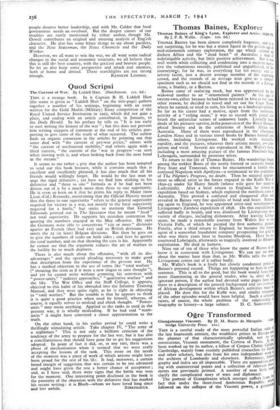Quod Scripsi
The Current of War. By Liddell Hart. (Hutchinson. 12s. 6d.)
THIS is a strange book. In it Captain B. H. Liddell Hart (the name is given as "Liddell Hart" on the title-page) gathers together a number of his writings, beginning with an essay written for the Gold Medal. (Military) Essay competition of the Royal United Service Institution in 1922, which did not gain a place, and ending with an article contributed, in January, to the Daily Herald. In his preface he tells us "It is too early to start writing the history of the war " ; but this does not prevent him writing snippets of comment at the end of his articles pur- porting to give some of the truth of what occurred. The author finds an organic connexion in the articles by pointing out that some deal with "the current of pre-war policy," others with "the current of mechanised mobility," and others again with a third current, the current of the 'war in progress '—as seen when moving with it, and when looking back from the next bend in the stream."
It seems to me rather a pity that the author has been tempted to send out this book because, while it contains much that is excellent and excellently phrased, it has also much that all his friends would willingly forget. He would be the last man to urge the rigid defensive ; yet here we find him sticking to his defensive and "three to one" formula as if he had not been driven out of it by a much more .than three to one superiority. He is even so keen on it that he prints his reply to Major (now Lieut.-Col.) Kennedy, maintaining that the Official History meant that the three to one superiority "refers to the general superiority required for victory in a war, not merely to the local superiority required for a battle," but omits to mention that General Edmonds pointed out in The Spectator that he meant "local" not total superiority. He supports his mistaken contention by quoting the numbers engaged in the May offensive. He says the Germans were able to concentrate "120 or more" divisions against 90 French (they had I to) and to British divisions. He omits the 22 (at least) Belgian divisions. But then he goes on to give the numbers of tanks on both sides ; and here he quotes the total number, and on that showing the Case is his. Apparently he cannot see that the argument reduces the art of warfare to the futility he so much deplores.
There is also much about the offensive, "with all its dis- advantages" and the special pleading necessary to make good that description from the experience of the present war. He has a marked objection to the use of terms like "total warfare" (" shouting the term as if it were a new slogan to save thought "), and yet he cannot write without gemming his sentences with "power-units," "indirect approaches," "qualitative warfare" and the like. The War Office and the Staff College, it appears, objected to this habit of his obtruded into the Infantry Training Manual, and they were quite right, as he is right in objecting to "total warfare." But the trouble is that he appears to think it is quite a good practice when used by himself, whereas, of course, it equally serves to mislead and check thought. " Power- units " may mean anything. Applied to the tanks as used in the present war, it is wholly misleading. If he had said " scare- units " it might have conveyed a closer approximation to the truth.
On the other hand, in his earlier period he could write a thrillingly stimulating article. Take chapter IV, "The army of a nightmare." This is not only a brilliant criticism of the tendency of the army to prepare for the last war, but it has also a conciliatoriness that should have gone far to get his suggestions adopted. In point of fact it did, or, at any rate, there was a phase of Mechanisation when it seemed that we were really accepting the lessons of the tank. This essay on the needs of the moment was a piece of work of .which anyone might have been proud for the rest of his life. It had, moreover, a certain broad margin of suggestion that was certain to be too advanced and might have given the rest a better chance of acceptance ; and, as I have said, there were signs that the battle was won for the moment. One interesting point disclosed in the book is the paternity of the obsession with the defensive that has marked his recent writing: it is Bloch—whom we have loved long since






























 Previous page
Previous page